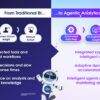Cloud adoption is becoming a new standard in the business landscape where cloud solutions are leveraged to help businesses survive in the global pandemic. The Covid-19 crisis has accelerated cloud transformation across industries and reinforced the importance to be digitally transformed.
IDC forecasts worldwide cloud spending to reach $1.3-trillion by the year 2025. Covering spending on both public and private cloud and even hybrid multi-cloud, this forecast can be due to the rising demand for video streaming services, online shopping, digital payment, online banking, e-government, telemedicine, e-learning, to name a few.
The financial sector has also started digital transformation. It has supported cloud-based core banking so that in future emergency and market disruption, digital initiatives will be critical to survival, resilience, and sustainability of the sector.
The country’s cloud-first policy, which promotes cloud computing as the preferred technology for government administration and delivery of its services, is also important as it provides the push to embrace cloud.
“Cloud is the new norm. It has open new growth opportunities, invented businesses and enrich customer experiences,” said Jimmy Go, president and chief executive officer at VST ECS Phils., Inc., in his keynote address at the VST ECS Cloud Summit 2021, a venue which offers insights and recommendations on how organizations can take advantage of cloud solutions to help their businesses survive in the digital economy.
Go also said that “whatever is your business priority, whether it’s business survival, business growth, resiliency, agility, operational excellence, or innovation, cloud has the underpinnings to help us transition to a digital-first economy.”
There are several motivations as to why organizations are moving to the cloud. Ann Garcia, Azure Business Group Lead at Microsoft Cloud, cited the following: reduction of capital expenses, end of support for mission-critical technologies, increase in business agility and scaling to meet market demands, and companies are looking at cost savings and improving customer experience and engagement.
For Ferdie Saputil, Google Cloud Lead for the Philippines at Google Cloud, some of the driving factors include developing applications better and faster. “Make sure that there is more data in terms of the apps you’re building – all these are built at the scale and how fast its agility is in delivering services and platforms to the market. The only platform that can deliver this is really cloud platform.”
Raymond Wong, general manager, IBM Cloud Platform, ASEAN at IBM Cloud, mentioned three reasons why companies should move to the cloud and these include cost, speed, and to be able to leverage innovations created on the cloud. For Allen Guo, country manager for the Philippines, Alibaba Cloud Intelligence at Alibaba Cloud, these are cost savings, keep data online always, and wider security capability in the cloud.
Companies embrace digital transformation to streamline operations. Workloads or applications that should be moved first to the cloud are those that are non-production – it can be a test environment, and looking into very specific enablement for the team because at the end of the day, it’s a different platform, according to Saputil.
“There’s a learning curve in terms of managing your cloud environment regardless if it’s from operations, project management, security, quite a few. In my experience, the first ones that really go are the first ones that are dictated by the business,” said Saputil.
On the cloud adoption path, there’s no single formula for it as there are several cloud computing models and services to meet the rapidly changing technology needs of the organization.
Garcia said deployment methods depend on the needs of the business. “Hybrid cloud platform gives organizations many advantages, either flexibility, more deployment options, security, compliance or getting more value of their existing infrastructure. Private cloud computing gives business the ability to scale on-premise infrastructure to the public cloud to handle any overflow, without giving third party data center access to the entirety of their data. The public cloud provides by running certain workloads in the cloud while keeping highly sensitive data in their own data center to meet their clients’ regulatory requirements.”
Regarding challenges in adopting cloud, Wong referred to users who are not equipped in terms of skills in adopting cloud. “It’s not about the availability of skills, it’s about the skills that are sufficient in the development, continuous operation, and running the apps of the cloud.”
On how safe is cloud when it comes to data security, Guo said cloud service providers (CSPs) need to take a lot of measures to protect data centers and to filter cloud infrastructure. CSPs need to offer some business-level security services to protect data centers and businesses.
The panelists also gave insights about the multi-cloud strategy or the leveraging of two or more cloud computing platforms to perform various tasks.
Saputil revealed that the multi-cloud strategy is something that Google has embraced for so many years. “In our DNA, when you think about Google, open source platforms, reliability and not having a vendor lock-in, and flexibility, etc. – we have built all of these things and the way we’re moving forward with it is now we’re putting some very specific industry-type solutions for multi-cloud either for telco, for banking especially in the area of e-banking solutions, we’re able to provide service which moves large on-premise or core banking apps.” He noted that there’s more management reliability and monitoring across any cloud platform.
In this time of pandemic, operating in the cloud is considered a must for most businesses but organizations should not be too dependent on any one cloud provider. Vendor lock-in can impact businesses because if a vendor’s quality of service declines, the client will be stuck with it.
Garcia disclosed that vendor lock-in is a common problem for adopters of cloud technology. “Even if your initial expectation for a cloud provider is positive, you may find after starting the cloud, your vendor is not. “But it’s important to really consider what your cloud goals are and which vendor is most likely to help you so you should also look for a service-level agreement or SLA that contains information on what the vendor will do to help you just in case you want to stop their cloud services. It’s really a must to check on this.”












































































































